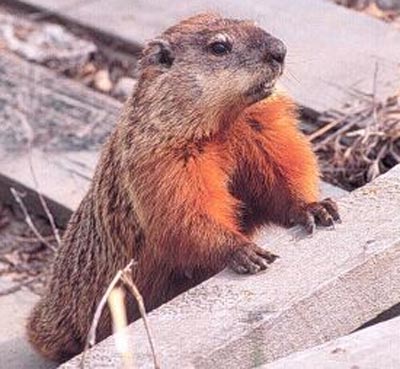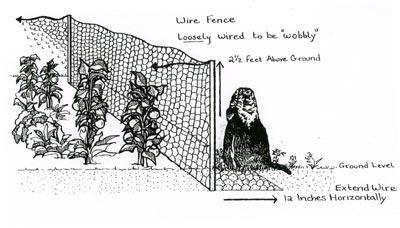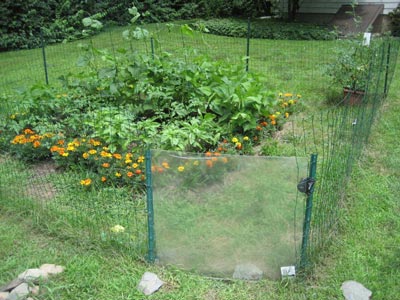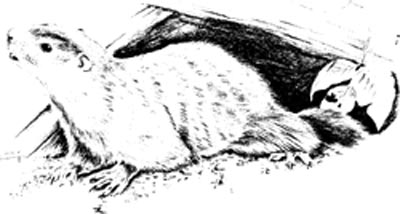Keep Woodchucks (Groundhogs)
from devouring your gardenThe Humane Society of the United States’ Conn.-based Wildlife Hotline is ringing off the hook with angry callers who echo the same sentiment: “woodchucks are destroying my garden, can you help?” There is a peaceful resolution to this conflict – one where humans and woodchucks can co-exist. 
According to Laura Simon, field director of urban wildlife for The HSUS, who runs the wildlife hotline, “This year we have received more than double the amount of woodchuck calls than last year at this time. Suburban landscapes make perfect habitats for woodchucks. Raised decks and sheds provide cover and a perfect place to raise young. Lush lawns and gardens provide a virtual buffet. Luckily, we can help gardeners and woodchucks co-exist using a simple and humane technique.”
No more woodchucks: The best way to woodchuck-proof your garden is to put up a simple chicken wire or mesh barrier. All you need is a roll of 3 ˝ - 4 foot high green vinyl garden fencing (16 gauge, with 2 inch by 3 inch squares) or chicken wire, some landscaping staples, a piece of Plexiglass, a mallet and some fence stakes. There are two top secrets for making a successful barrier: 1.) The top portion of the fence needs to be 2 ˝ to 3 feet high but it should be staked so that it’s wobbly ---i.e. the mesh should not be pulled tight between the stakes but rather, there should be some “give” so that when the woodchuck tries to climb the fence, it will wobble which will discourage him. Then he will try to dig under the fence. 
Sketch Courtesy of The HSUS
2.) So that he does not dig under the fence, be sure to extend your mesh fence straight down into the ground and then bend it and extend the final 12 inches outward along the ground, away from the garden, in an “L”-shape, which creates a false bottom. Secure it firmly to the ground (using a mallet) with landscaping staples so the woodchuck cannot go under it. When the woodchuck digs and hits this mesh flap, he will think he cannot dig any farther and give up. It will not occur to him to stand back a foot and then dig. 3.) For the door to the garden, put a 26 inch high piece of Plexiglass between 2 stakes, and run a piece of mesh under it which extends at least 12 inches in front (secured with landscaping staples) to prevent woodchucks from digging under. The Plexiglass door will be slippery and high enough to prevent the woodchuck from climbing over it but low enough for people to step over. Most hardware stores will cut Plexiglass to whatever size is desired. 
Photo Courtesy of The HSUS
Why not just trap the woodchuck family? Trapping will not solve the problem. It makes it worse. As long as your yard provides woodchuck habitat, you will have woodchucks. Studies show that even when all the woodchucks are trapped out of an area, others from the surrounding area quickly move into the vacated niche. In addition, trapping and relocating woodchucks can lead to orphaned young. It is easier and more effective to simply exclude woodchucks from gardens during the peak summer growing season and work on other issues, such as evicting them from under decks, when the timing is right for that. 
The HSUS Wild Neighbors Program promotes non-lethal means for resolving conflicts between people and wildlife and cultivates understanding and appreciation for wild animals commonly found in cities and towns.
The program’s book, Wild Neighbors: The Humane Approach to Living with Wildlife Second Edition is a useful reference for individuals and communities faced with resolving encounters with wild animals who find their way into yards, gardens, houses, parks and playgrounds. is a useful reference for individuals and communities faced with resolving encounters with wild animals who find their way into yards, gardens, houses, parks and playgrounds. On the web at humanesociety.org/wildneighbors.
<
Top of Page
Back to Lawn, Yard and Garden
|